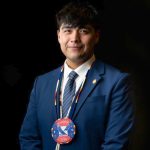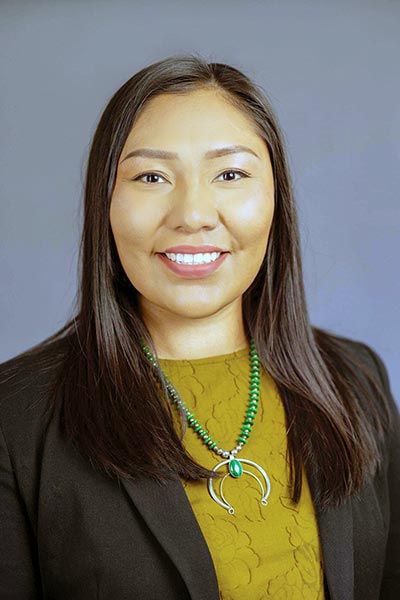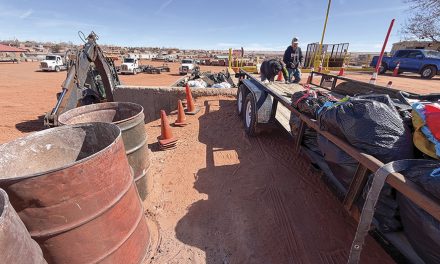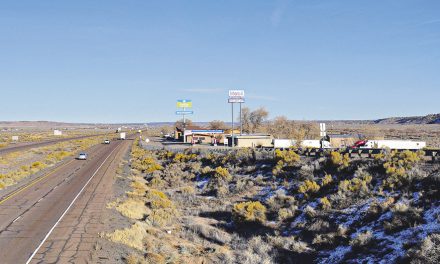
NAU’s Wheeler named outstanding graduate student
FLAGSTAFF
During her second year in the counseling/school psychology doctoral program at Northern Arizona University, Melissa Wheeler did a practicum at Counseling Services.

Melissa Wheeler
Of all the students who went in and out of her office, she noticed something that bothered her – none of the clients looked like her.
Wheeler was afraid that Native American students needed help but weren’t coming to CHS to get it.
So, she went to them.
Wheeler, who grew up in Round Rock, set up in the Native American Cultural Center, according to an NAU news release.
Outside of the formal clinical spaces, without the need to make an appointment where students could just come into her office when they had a little time and talk to someone who looked like them, Indigenous students began showing up.
“They didn’t want to go through formal counseling, or there was mistrust of the system, or they didn’t like the environment,” Wheeler said. “It was sterile, and they didn’t feel comfortable.
“All of that just made students step back and think maybe it’s not that big of a deal,” she said. “With me coming out of those formalized Counseling Services spaces and going to spaces where Indigenous students are and providing services there, people just come in.”
Wheeler is in her fourth year at NAU. Ahead of her is a year-long internship and a dissertation.
But her career has been outstanding enough already to warrant national recognition. She was one of only 10 graduate students nationwide selected for the second cohort of Rising Graduate Scholars from Diverse: Issues in Higher Education.
This recognition identifies exceptional graduate students based on scholarship and trajectory toward a promising future in academia or other fields.
“Melissa is an extremely competent doctoral student who has consistently worked to impact her own, as well as other, tribal communities through her research, clinical and mentoring activities,” said Y. Evie Garcia, the doctoral training director and associate professor in the College of Education. Garcia nominated Wheeler for the award.
“She has presented her work nationally and internationally and is already a rising star in Native American psychology,” she said. “Melissa is a caring and diligent person, and it has been such an honor to work with her in the Combined Counseling/School Ph.D. program.”
Journey to NAU
By the time Wheeler arrived in Flagstaff in 2018, she had a lot of experience in the classroom.
She had a bachelor’s and a master’s in psychology from the University of North Dakota, where she worked as a research specialist. Before that, she attended a tribal college in Albuquerque.
“I loved school so much when I was a kid,” she said. “I remember telling my teachers that I wanted to go to school forever.”
Young Melissa was not wrong, she said with a laugh, she’s on year 26.
Education was always crucial in Wheeler’s family. Her single mother and grandparents, none of whom had the chance to get a bachelor’s degree, always stressed the need for her to make it a priority and to be an example to the rest of her community.
She also found mentors – Indigenous mentors whenever possible – who told her the same thing, and she shared the same message with the younger students she mentors.
“My family’s the reason why I chose to pursue higher education,” she said. “Being one of the first to get a bachelor’s and a master’s in my family is challenging in so many different ways, but it’s also rewarding – I get to show my younger siblings it’s doable, and other people in the community too.”
When she decided to get a doctorate, Wheeler started looking at options. She found NAU and immediately felt a connection.
It’s one of the few universities she’s seen that prioritizes providing adequate educational services to Indigenous populations. She saw that commitment in the way leaders spoke, in the academic mission, and the everyday work of the university.
“It isn’t just the mission statement that they say, but there’s actual work with the tribal communities,” she said. “It was one of the main things that drew me to this university. It wasn’t just the location, but the people that I met during my initial interview that made NAU feel perfect.”
The importance of visibility
Wheeler doesn’t think of herself as a role model; she’s just a grad student working toward her goals.
However, it’s hard to ignore the facts. There is a distressingly small number of Indigenous graduate students, especially in psychology.
Even more distressing is that Indigenous people are more likely to seek mental health care from an Indigenous provider. If those providers aren’t there, people are more likely to need care.
Her work at NAU has been focused mainly on serving Indigenous populations, first at NACC and now through a fellowship with the Center for Health Equity Research.
That’s part of her motivation. In addition to the importance of education, tribal leaders and her family quickly reminded her that she had a responsibility to come back and help her people. It’s important that she’s here.
And, she said, it’s important that others are here too. In fact, with the hiring of assistant professor Chesleigh Keene into her department, Wheeler had her first Native American professor of her entire collegiate career.
She has several mentors from her tribe and others but had never been in a classroom led by a Native American until then.
This year, several Indigenous students were interviewed for the doctoral program, and when she applied, she was the only one.
What’s next
When she started, Wheeler planned to do a dissertation centered on her work offering counseling at NACC.
However, last fall, she applied for a fellowship with CHER to work on a culturally centered addiction research study program. That work focuses on how telehealth has been used in substance abuse treatment.
Her dissertation research will build on the research CHER is doing. She will examine cultural treatment practices and identify practical approaches based on what culturally sensitive methods were used effectively over the last couple of years.
She’ll spend several months formulating questions, conducting interviews, and collecting quantitative data. About midway through her yearlong internship at the Southwest Behavioral Health Center in Buckeye, she’s hoping to defend her dissertation.
Once she graduates, Wheeler isn’t sure what comes next – clinical or academia, and both offer opportunities about which she’s excited.
“In the United States, there are less than 300 Native American self-identified psychologists,” she said. “For Navajo psychologists, there are less than 20. There’s not that many of us out there. I hope to make that difference someday soon.”
Her training director, Garcia, expects nothing less.
“She will undoubtedly employ her skills as a future university professor and psychologist to revolutionize research and training practices,” she said, “as well as integrated mental health care approaches that reduce disparities for Native American communities.”








 Highway 264,
Highway 264, I-40, WB @ Winslow
I-40, WB @ Winslow